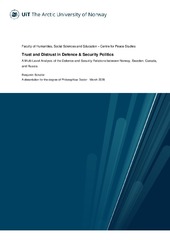| dc.description.abstract | Trust has always played an important role in world politics. At the same time, trust remains a largely undertheorized concept in the studying of international relations. Against the backdrop of renewed political and military tensions between Russia and the West, this doctoral thesis takes a closer look at the mechanisms, processes and conditions that lead to the formation of trust and distrust in international relations, more specifically within defence and security politics.
Previous research on trust and distrust in international relations has predominantly focused on the structural level of state-to-state relations. It suggests that trust is either the result of interest-driven cost-benefit analyses of rational state actors or the by-product of an emerging collective identity among states. However, the role of different defence and security practices, interpersonal trust between practitioners on the ground, the impact of the diverse identities, interests, and actors at the national level have largely been absent from these approaches. To address this problem, this thesis combines previous rationalist, constructivist and practice-theoretical approaches to study trust in international relations with social contact theory, and conducts an in-depth qualitative analysis of the role of trust and distrust at the structural (state-to-state), interpersonal (practitioner-to-practitioner) and what I call the communicating level (structural vs. interpersonal) in the defence and security relations between Norway, Sweden, Canada and Russia. In order to contribute to a broadened understanding of how trust and distrust are being perceived, experienced and how they affect the different levels in national defence and security policy-making, the analysis in thesis draws on the main defence and security policy documents of Norway, Sweden, Canada and Russia as well as other central primary and secondary sources, compiles a network graph of their defence and security relations, and conducts a series of semi-structured interviews as well as a focus group discussion with various defence and security practitioners from Norway, Sweden and Canada.
The analysis of this thesis shows that trust and distrust at the structural level in international relations are largely the outcome of a constant interplay between the moralistic (national identities), strategic (national interests) and practice layer (security practices) of trust in defence and security politics. It highlights how the most durable and comprehensive trust-relations between states form around all three of these layers, which are of fluent character, tend to overlap, and can substantially differ across policy areas, regional and political settings, helping us to explain some of the different dynamics in the formation, loss and restoring of trust in interstate relations. At the interpersonal level, the analysis of this thesis shows that most forms of military cooperation and military-to-military contacts contribute to increased levels of trust among practitioners. However, we have also seen that the forms of military cooperation and interaction, which are particularly suitable for building trust at the interpersonal level (e.g. joint trainings, exercises or operations) are primarily implemented between states which already enjoy high levels of mutual trust in their relations. The trust-building effect of those measures that states implement to reduce distrust and to deconflict their defence and security relations (e.g. arms control, military confidence-building, incident prevention mechanisms), on the other hand, hardly extends beyond a very small group of subject matter experts on the ground. Finally, at the communicating level, this thesis shows that trust and distrust are not fixed properties, but they are, in fact, the outcome of a complex and constant coordination and negotiation process at the national level. This process, which is strongly affected by political (e.g. national identities and interests), institutional (e.g. hierarchies, time constraints or rotation of personnel) and personal (e.g. experience, rank, personal contacts) facilitators or constraints, often results in either a mere top-down reproduction, or a bottom-up transformation of the identities, interests and practices in the defence and security relations between states. Thus, the findings of this thesis suggest that in order to develop not only deeper, but also more stable levels of trust in their defence and security relations, it is important that states ensure a more inclusive and transparent decision-making process, allowing for a credible two-way representation of their defence and security identities, interests and practices at the structural and interpersonal level of trust in international relations. | en_US |
| dc.description.popularabstract | How can states form more trustful relations in defence and security politics? Against the backdrop of deteriorating trust in the relations between Russia and the West, this thesis analyses the role of trust and distrust in the defence and security relations between Norway, Sweden, Canada, and Russia. The thesis that many measures that states implement to increase the levels of trust in their relations often achieve their intended affects within a small group of practitioners and experts on the ground, while a more substantial overall impact on their relations is often constrained by political and institutional factors in national decision-making processes. To address this issue, the findings of this thesis suggest that states should develop institutional mechanisms that allow for a more transparent and inclusive national decision-making process, as well as complement existing trust-building measures in defence and security politics with more trust-building efforts at a higher political and military level. Thereby, this thesis not only enhances our conceptual understanding of trust and distrust in international relations, but also makes an important contribution to ongoing policy debates on NATO-Russia relations and the future of military confidence-building in Europe. | en_US |


 English
English norsk
norsk
